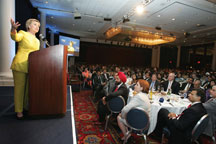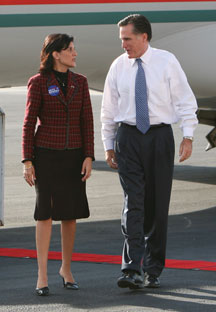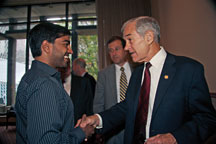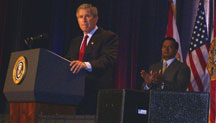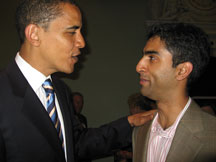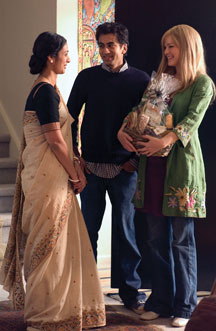Magazine
Power Politics

Indian Americans are rolling up their sleeves this election as never before.
|
When an Indian American techie gives up a dream job at Google to follow a political candidate into the wilds of the New Hampshire primaries, you know it’s a serious commitment. Vijay Boyapati, a software engineer with Google News, believes so strongly in Congressman Ron Paul that he did just that. If you haven’t been following the presidential race fully or are confused by its crowded playing field of contenders, you may well ask “Ron Who?”
But that’s OK. The media focus is on the front-runners, but for Boyapati the choice was clear-cut. An Australian born Indian immigrant, he became a U.S. citizen as he was enamored by the idea and ideals of America. “Ron Paul is the only candidate talking about the constitution. In the oath of office people always swear to uphold the constitution and to defend it against all enemies – foreign and domestic. He’s really the only one who’s talking about it, and if that’s the oath of office then I think he’s the only candidate people should be voting for. Some people tout their experiences to show what they’ve done, but to me some of their experiences show me they haven’t been consistently defending the constitution.” Boyapati quit his job at Google in November to start up Operation Live Free or Die, a grassroots effort to bring 1,000 people to New Hampshire before the primary to reach out to voters about Paul and his powerful message. As for sacrificing his golden Google job to follow a dream of freedom, he says, “I can’t think of anywhere else I’d rather be, or anything else I would rather be doing, so my decision to leave Google was an easy one for me.” As the presidential campaign kicks into gear with the first primaries in January, Indian Americans are increasingly joining the fray. Even many Indian Americans who are not yet citizens (which is a majority of Indian immigrants) are responding to the political call. Amol Naik, a lawyer and political volunteer in Atlanta, Ga., is among those exhorting these green card holders to become politically active: “They should volunteer, they should inform themselves, they should work toward becoming citizens and when they are given citizenship, they will be able to engage in the political process. For many people coming directly from India and getting green cards, their kids will be born in the US. It’s very important for them to be able to pass along the importance of civic involvement in those kids. Staying informed and involved in these campaigns is a way of doing that.” Sanjay Puri, chairman of US India Political Action Committee (USINPAC), a national, bipartisan organization, says Indian Americans are involved in all aspects of the presidential campaign from fundraising, grassroots work and volunteering to actually creating policy and serving on the staff of several campaigns. “With the Democrats, because of their historic relationship, it’s been Sen. Hillary Clinton all the way,” he says. “But now with Sen. Barack Obama, there’s going to be a real shift in the community, because the Obama supporters are mostly from the second generation of Indian Americans.” He also finds that while Indian Americans lined up behind the Democratic contenders quite early in the game, on the Republican side few have committed. “The longer you hold the stock, the higher the return you get,” he points out. “After the nomination, it becomes very difficult to build relationships.” He is impressed by the participation of Indian Americans during this election cycle: “The surprising thing is that this election has really brought out the second generation. Historically the second generation stayed away. I think this is testament really to Sen. Obama who has gone out for the second generation of Indian Americans, just as he has done with so many other young people in very different communities. His appeal to the young population is just tremendous.” Sen. Clinton has tapped into the deep connections among Indian Americans with former Pres. Bill Clinton. When hotelier Sant Singh Chatwal organized a fundraiser in New York for the senator, 1,200 people turned up from several states, raising $3 million, according to Chatwal. Chatwal’s goal is to raise $5 million for Clinton from the community and is planning more fundraisers after the primaries.
Chatwal points out that Bill Clinton is the only living president to have visited India several times and says, “I personally feel the Clintons have great ties with India and that is one reason that many in the Indian community have been supportive of them.” He adds: “I feel if you look at the choice, it’s the experience. Obama doesn’t have that level of experience. Just voting yes or no doesn’t make you a good president.” He points to Clinton’s experience over the years, and the added value of Bill Clinton who, says Chatwal, was the most successful U.S. president: “He has been a very balanced president. It’s a very big plus point. As an Indian, I love India and I want people to support India, but as an American, certainly I’ll go for Hillary Clinton because of her experience.” This Indian connection has certainly not gone unnoticed by the media or the campaigns, and there was quite a brouhaha when the Obama camp referred scathingly to Hillary Clinton as the senator from Punjab. In most parts of the community this moniker is a compliment, reflecting the Clintons’ connections to India and Indian Americans. Swati Dandekar, the first Indian American state representative from Iowa District 36, has also thrown her support behind Clinton, even hosting her campaign event at her home. Why Hillary Clinton? “I am supporting Hillary because she has the experience and strength to become the leader of a great nation from day one. I feel that this is one candidate who understands both foreign policy and domestic policy in-depth.” Asked if her Indian heritage comes into play in selecting a presidential candidate, Dandekar responded: “I look at it from a foreign policy point of view. I am a legislator and I think she will be great toward India, but she will be great for the whole world. That’s the way I look at it because foreign policy is very important for all of us.”
What about the Indian-U.S.nuclear deal – do such things come into the equation at all? “Not really. I look at it as a whole picture and she did support the nuclear deal… I see where she stands when it comes to domestic policy; what will she do for healthcare, for education. And you know, that affects Indian Americans too, because we are living here and we want a great education for our children and great healthcare for all of us. And my neighbors, who are not Indian American, are looking for the same thing. So when I look at it, I look at it as a whole picture.” Iowa, which holds the first caucus on Jan. 3, has attracted the most media attention. Iowans are reputed for taking the caucuses very seriously and the 8,000 Indians living in the state seem to be doing so as well. Rita Arora of Iowa City is vice chair of the Eastern chapter of the Iowa Asian Alliance, a social organization, and has committed to Sen. Obama. “I’ve been impressed with his clarity of thinking, his simple approach to everything – very close-up, very concise. We need somebody who is going to be a global statesman who believes that diplomacy is the cure and not war,” she says. “With his background, he’s the only one who’s capable of doing this, literally getting everybody to the table. And I see that a lot of people of Republican background, and even farmers who would never have thought of voting this way, are leaning toward him. They see in him someone who has the heart and the vision to make this country what it should be.” Her college student daughter is also an Obama supporter and the family held an event for him in their home. She says, “Whether it’s Obama or Clinton, I think we have very good candidates in the Democratic Party. People are now voting for the best candidate, even if it means crossing party lines. In Iowa we have 120,000 students who will vote. Single-handedly these students can decide which way the election goes.” The popular Indian American actor Kal Penn (of Harold & Kumar and The Namesake fame) has also flung himself into the race as a volunteer, donor and surrogate for Obama, “I’m fired up and ready to go. I’ve been politically conscious since I was young, but I have never volunteered to campaign like this before.” Penn ticks off Obama’s appeal: “His unique experiences, qualifications, and integrity are what drew me to support his campaign initially. But it’s his understanding of the world around him, his voting record, his opposition to the Iraq war from the start (in 2002 when it was incredibly unpopular), his background as a civil rights lawyer, and his refusal to accept special interest money in his presidential campaign. This is our chance as Americans to reclaim the country for all Americans, not just ‘red state’ vs. ‘blue state,’ NRI vs. ABCD.” The word “integrity” crops up frequently in discussions about Obama. Says Penn, “When CNN packs up and goes home, and Reuters has left, and all 6,000 people have gotten in their cars to drive home, Barack Obama is the same person in the remaining room of six people that he was in a crowd of 6,000. That means a lot to me.” Penn, who has been volunteering in Iowa, Nevada, California, and plans to be in New Hampshire and South Carolina, says he was emotionally moved by the representation of people from all walks coming together. “Here are a lot of young Indian Americans working at every level from the higher staff positions to volunteers,” he says. “In the Iowa office alone, there are several dedicated South Asian American students who have taken an entire year off to volunteer.”
A grassroots group, South Asians for Obama (SAFO), has chapters nationally. It has organized everything from low-dollar social gatherings, debate-watching parties, phone calls to voters, high-dollar fundraisers, to community discussions. “Sen. Obama’s background is one that the Indian American community can relate to. His father came to the United States to study, and when he talked about ‘a skinny kid with a funny name’ at the 2004 Democratic National Convention, he could have been talking about any of us,” says Dave Kumar, a lawyer and co-founder of SAFO: “His candidacy represents the best of what this country has to offer. Many of us or our parents came here because we believed that the United States offers opportunities for all based on merit regardless of race or ethnicity, and Sen. Obama’s candidacy speaks to this American ideal.” Hrishi Karthikeyan, a lawyer in Washington and another co-founder of SAFO, says: “Obama favors humility and accountability in our foreign policy; he believes individual responsibility goes hand-in-hand with collective responsibility; and he has articulated a thoughtful agenda on education, immigration, health care, economic policy and a host of other domestic priorities. “I think Obama’s message is the right one for our community, because he epitomizes the values that brought our families to this country and which we still hold dear. In addition, he has consistently demonstrated good judgment on the critical issues of our day. These are the qualities that I believe are essential in a strong national and international leader, and which give our community the best opportunity for advancement for the next generation.” Anhoni Patel, a writer who heads SAFO’s San Francisco chapter, finds that even first generation Indian Americans are responding to Obama: “Although my dad has been a registered Republican for over 30 years and has voted for Republican candidates, and cannot vote in the Democratic primaries, he is sold on Obama. He heard him speak and liked what he heard and was moved by his speech. He even donated to Obama’s campaign!” Says Patel: “I believe in what he says and what he stands for. When he opens his mouth, I sincerely believe that he’s telling the truth rather than spewing political jargon. In fact, I’ve looked him straight in the eye and can tell you firsthand that the man believes in what he says.” Kumar is attracted to Obama’s immigration policies, such as supporting legal immigration, strengthening family reunification, and reforming the H1-B visa regime to make H1-B visa holders less dependent on their employers for their right to stay in the country. He says, “But perhaps most importantly, Sen. Obama has spent his entire adult life working on behalf of people who have traditionally lacked power in our society, fighting for civil and economic rights of minorities and the poor.” Speaking of the disenfranchised, John Edwards’ campaign theme on the two Americas has resonated with Shi Shailendra, founder and CEO of the Atlanta based Shailendra Group, and Amol S. Naik, a young Atlanta lawyer.
“Personally I think Edwards has the clearest plans on healthcare, education, global warming and the war in Iraq. He’s set up specific plans of action on what he’ll do when he’s elected and he’ll stand by it,” says Naik.” In many respects he’s the most progressive candidate in the field, but he’s also the most electable candidate. Every major poll you look at in swing states, he beats every Republican nominee.” Naik says, “Edwards certainly has strong support within the Indian community. His story of humble roots – his father and grandparents worked in a mill – he is a self-made man in that way. I think that resonates with a lot of Indian Americans who came here and made their own way in this country.” Are the qualities Indian Americans look for in their candidate different from the mainstream? Says Naik: “I don’t think you can necessarily characterize Indian Americans as a single issue voting block. I think in many respects these voters look for what all other voters do in America – strong principles, someone who can project a strong image of America across the world to undo the last eight years of George Bush, and in that respect I think Indian Americans are very similar to most other American voters.” Naik’s father emigrated in the 1970s from India and both generations are active in the political process. Naik is a member of the Indian American Leadership Initiative (IALI), which promotes Indian American involvement in the Democratic Party. Naik says: “I think most Indian Americans would classify themselves as Democrats, but there are certainly many prominent Republicans, especially the governor of Louisiana. It’s really encouraging to see the political activism in the Indian American community.” Recalling his own family’s humble background in India, Naik adds: “To me John Edwards’ efforts on behalf of people that no one speaks for in this country, the impoverished, are really inspiring. His laser-like focus on ending poverty in America is really going to resonate with Indian Americans. We’ve seen real poverty in India and that’s an issue more Indian Americans are really concerned about than most people are.” On the Republican side, most Indian Americans seem to be hedging their bets. South Carolina State Legislator Nikki Haley, however, came out early in the game for Gov. Mitt Romney. “I don’t think we have ever had a more important election than this one. In the past, I have refrained from endorsing in the Republican primaries,” she says. “Obviously, supporting Gov. Romney is an exception to that rule, but it is one I felt compelled to make considering the crucial crossroads we face as a country. We have a pressing need for strong leadership that can move our country forward, both at home and abroad, and there is simply no one better equipped to do that than Mitt Romney.”
Haley, who has a Sikh background, says the foremost issues on her mind are improving the quality of life, the education system and the economic climate: “Certainly, issues come up that you have to address in the short-term, but I’ve tried to approach things from a generational standpoint. Specifically, I have always tried to take from the wisdom of my parents and grandparents in an effort to make decisions that will benefit my children and grandchildren. One of the best ways to do that is to get involved in the political process, to be responsible with our voice and our vote.” The Washington based Indian American Republican Council (IARC), which was formed in 2002 by Dr. Raghavendra Vijayanagar, has not yet endorsed any candidate, although Vijayanagar is supporting Rudy Giuliani. Narender Reddy, of Atlanta, Ga., is on Giuliani’s Finance Committee for Georgia and has co-hosted two fund raisers for the candidate in Atlanta. “I had the opportunity to meet with Giuliani on several occasions and am very much impressed with his personality,” says Reddy. “I’d like to see our next president take a lead in getting rid of terrorism of any kind and have proven leadership skills to lead the country in difficult times. I strongly believe that Giuliani has those capabilities more than any other Republican presidential candidates. Rudy’s skills, as mayor of New York City, as a crime fighter are well known.” Does Reddy think that Giuliani shares the concerns of Indian Americans on immigration, the nuclear deal and outsourcing? “Among the pool of Republican candidates, I believe, Rudy has more understanding of the Indian American community’s needs than any other candidates,” says Reddy. “As mayor of New York, he was well connected with our community. He is for free economy with no restrictions and would not do anything to hurt the outsourcing business, which is helping the U.S. economy by keeping the prices of services and products lower. Rudy will continue Bush’s policies of strengthening Indo-US relations through the nuclear deal, etc.” Indian American fundraisers were exceedingly visible for George W Bush, but have kept a low profile this season. Says Reddy, “I haven’t heard of any known Indian American Republican leaders taking an active role in supporting any particular candidate. I’m not surprised, because usually with the limited financial resources the community has for political causes, it will not take an active role in any primaries.” Dr. Zach Zachariah, a noted Florida cardiologist, who was president of the Bush-Cheney Campaign Finance Committee and a formidable Republican fundraiser, is waiting out the primaries. He says: “There are five candidates on the Republican side and any one of them could get the nomination. People whom I’ve worked with for the last 20 years, I’ve spoken to several of them and none of them have taken a stand yet on any of the candidates. They feel all the candidates are equally qualified.” Asked if he had any personal favorites, Zachariah says, “I know all five of them very well. The Republican Party has some issues and I believe they are working through them right now and in the next 30 days we will have a much clearer idea about how things are going to go.” Zachariah’s politics are not influenced by Indian American concerns. His evaluates candidates as an American, he says, so India-oriented issues don’t impact him, although he concedes they may resonate with many Indian Americans. He hastens to add: “I want the US to have great relations with India, don’t get me wrong.” Reddy says he is observing a shift in the pattern of Indian American politics: “While 95% of the first generation routinely supported the Democratic Party, I see a change in the second generation. They are more open to considering the Republican Party. I would guess that at least about 30 percent of the second generation is supporting the Republican Party. I strongly believe, as the number of the second generation grow, the Indian American support to both political parties will be balanced equally.” Sen. John McCain too has ardent supporters in the Indian American community, among them Washington-based Kishan Putta, who worked on McCain’s campaign in 2000 and is again active in his presidential bid and also in his health care policy. “I realize that the most important thing you can have in a candidate is someone you can trust, someone who is not going to do what most politicians do and tell you what you want to hear and spin their positions,” he says. “He’s often come out looking unpopular on some positions, but people always respect him for his stances.” Putta adds that of all the leading candidates, McCain is the only one who has served in the military and was not only a war hero, but a prisoner of war: “His own son is in Iraq right now; none of the candidates has a child who is in Iraq. The biggest foreign policy issues we have right now are Iraq and the war on terror and he’s the one who knows these issues and has the most foreign policy experience.” Putta, who is helping the McCain campaign build coalitions in the South Asian community, believes his healthcare plan is a very bold, which will appeal to many Indian American medical professionals: “He has the best health care plan around. It might not sound the coolest or most attractive in a sound bite, but he has a very thoughtful plan. That’s one of the biggest reasons I support him, because I’m really into health care policy and he has the best plan of all the candidates.” One of the biggest wild cards in this election is the role of the Internet. Boyati says: “There are huge numbers of young people excited by Ron Paul’s ideas because he’s talking about freedom for everyone and that is a really popular idea, especially with kids who are on the Internet, because the Internet is one of the few spaces where you do have true free speech and so for people who are online, these messages really resonate with them.” The former Google employee believes the Internet will play a significant role this election season: “That’s a very important factor because the media has not given him any attention. He raised $6 million in a single day. No other American candidate has raised so much in American history. It got very low coverage in the mainstream media. With the Internet, people can find out information themselves. They don’t need to have information thrust upon them by the media, which decide what’s important and what’s not.” Putta, who supports McCain, endorses that view of the importance of the Internet. “It has allowed Indian Americans to stay in touch across the country. We are a pretty technologically savvy community so that’s really increased the way for us to get involved.” Says Puri of USINPAC: “Indians are becoming politically active. They understand that they need to contribute and be involved in campaigns. They are out there. They are in grassroots, they are in campaigns, they are volunteering, they are making policy, they are donors and contributors – it’s all across, it’s incredible. And it’s a very good thing.” Putta, who is in his 20s served as an intern in Washington, DC, with 50 young Indians, most of whom remain politically active. “I am one of the few Conservatives and Republicans and it was very hard for me over the years, because especially then, when I was first starting out, all the Indians were Democrat and liberal. They would often see me as an outsider at that time. Only over the years did they come to respect me for sticking with my beliefs.” He finds that many second and third generation Indian Americans are Independent. The younger generation is financially savvier than their parents and fiscally moderate or conservative, he says. “What a lot of people don’t know about the early primaries is that independents can have a big voice. The New Hampshire primaries are probably the most important. Independents can decide if they want to vote for Democrats or Republicans whereas Democrats can only vote for Democrats and Republicans can only vote for Republicans. And that’s where John McCain’s cross-party appeal comes in very handy. He always tells the truth even when it’s unpopular and the independents respect him for that.” Indian Americans can be involved or apathetic, prosaic or idealistic when it comes to politics. “You know when I decided to become a citizen here. I wasn’t escaping war, poverty or anything like that,” says Boyapati. “I chose to become a citizen, because I believed in the principles this country was founded on. And I think it’s my job and the job of other Americans to get those things back.”
|

